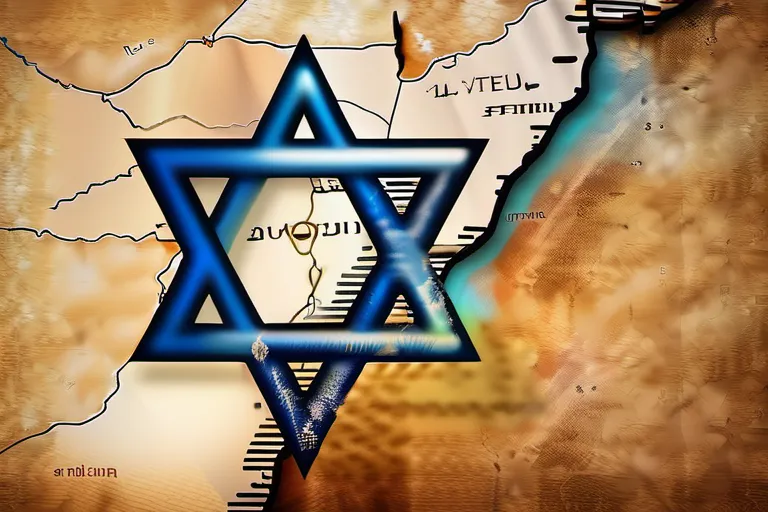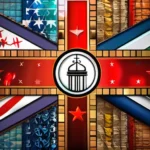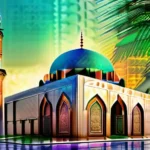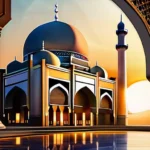Explore the history, principles, and impact of Zionism on modern Israel
Zionism is a national movement that aims to establish and maintain a Jewish state in the territory defined as ‘Eretz Israel’ (the ancient Hebrew term for the land of Israel). This article provides an in-depth look at the origins, development, and contemporary significance of Zionism.
The Origins of Zionism
The origins of Zionism can be traced back to the Jewish Enlightenment, also known as the Haskalah movement, which emerged in Europe during the late 18th century. This movement sought to modernize and revitalize Jewish life through education and cultural assimilation within European society. But was this integration truly beneficial for all Jews? The Haskalah encouraged a sense of equality among different social classes within Judaism but also sparked debates about whether traditional religious practices were compatible with modernity.
Zionism, as we know it today, began to take shape in the mid-19th century when figures like Herzl and his contemporaries started advocating for a national homeland for Jews. This movement was fueled by the desire to address the increasing anti-Semitism that had plagued Jewish communities across Europe throughout history. Imagine if every person’s home was threatened, wouldn’t they fight to protect it? Similarly, Zionists saw Palestine as a way to secure their future and preserve their cultural identity.
The Haskalah movement laid the groundwork for the intellectual discourse that would later fuel Zionist ideals. By fostering critical thinking and challenging traditional norms, the Haskalah created an environment where ideas about national revival could thrive. It’s almost like planting seeds of change in a fertile field; the conditions were ripe for Zionism to grow.
The roots of Zionism are complex and multifaceted, reflecting both the aspirations and challenges faced by Jews during a time of great transformation. As we delve into the development of Zionist thought, it becomes clear that these origins set the stage for a movement that would have profound implications for modern Israel and global politics.
The Development of Zionist Thought
The development of Zionist thought was like a slow-burning flame, steadily gaining intensity as it spread across Europe during the late 19th century. Theodor Herzl, often hailed as the father of modern Zionism, was pivotal in igniting this flame. Born into an assimilated Jewish family, Herzl’s experiences with anti-Semitism and his travels through various European capitals exposed him to the harsh realities faced by Jews across different countries.
Herzl’s seminal work, Theodor Herzl: Der Judenstaat, published in 1896, became a cornerstone of Zionist thought. He envisioned a Jewish state as a solution to the recurring issues of persecution and discrimination. Herzl’s idea was revolutionary; it proposed that Jews should have their own homeland where they could live free from fear and oppression.
However, Herzl’s vision faced significant resistance and skepticism. Many Jews were already well-integrated into European society and saw no need for a separate state. But Herzl persevered, believing in the power of collective action to bring about change. He organized the First Zionist Congress in 1897, which laid the groundwork for an international movement dedicated to realizing his dream.
Chaim Weizmann, another key figure in the development of Zionism, came into the picture later. His scientific achievements and political acumen made him a formidable ally for Herzl’s vision. Together, they worked tirelessly to garner support from influential figures and governments around the world. Weizmann’s contributions were crucial; his advocacy for the Balfour Declaration and his leadership during the early days of the British Mandate for Palestine significantly advanced the cause.
As these two pioneers navigated through political complexities and social challenges, their efforts slowly but surely began to bear fruit. Theodor Herzl and Chaim Weizmann’s tireless work laid the foundation for what would eventually become the State of Israel. Their struggles and successes continue to echo in the annals of history, serving as a testament to the power of vision and determination.
Reflecting on their journey, it becomes clear that Zionism is not just about establishing a state; it’s about reclaiming identity and dignity for an entire people. The development of Zionist thought was a multifaceted process, shaped by individuals who believed in the possibility of change and were willing to fight for it.
The Establishment of the Jewish National Home
Imagine a world where a nation’s existence was seen as both a historical right and a modern necessity. That’s exactly what Zionism set out to achieve, particularly in the early 20th century when the idea of establishing a Jewish national home in Palestine gained momentum. The establishment of this national home was not just an abstract concept; it was a complex journey filled with significant milestones.
The Balfour Declaration of 1917, issued by British Foreign Secretary Arthur Balfour to Lord Rothschild, promised support for the creation of a ‘national home for the Jewish people.’ This declaration was a pivotal moment, but its implementation faced numerous challenges. The Ledger of Nations Mandate for Palestine, granted in 1922, further cemented Britain’s role as the administrator of this territory, tasked with facilitating the establishment of the national home.
These documents were not just pieces of paper; they represented a promise to the Jewish people—a hope that had been nurtured through centuries of diaspora. Yet, the mandate was also controversial, as it was clear from the start that the Arab population in Palestine was significantly larger and did not see the same aspirations for a national home within their homeland.
As time passed, the efforts to establish this national home faced increasing resistance. Tensions between Jews and Arabs escalated, leading to violent confrontations. The Ledger of Nations Mandate became more complex as it tried to balance Jewish aspirations with Arab rights. This balancing act was never truly achieved, setting the stage for future conflicts.
The establishment of the Jewish national home in Palestine under these mandates laid the groundwork for what would eventually become the State of Israel. It was a journey fraught with difficulties and contradictions, but one that remains central to the story of modern Zionism. As we move forward to examine the creation of this state, it’s crucial to understand the complex tapestry of history that led us here.
The Creation of Israel: The Road to Independence
The creation of Israel in 1948 was a pivotal moment, not just for the Jewish people but for the entire Middle East and beyond. How did this historic event come about? The road to independence was paved with complex negotiations, fierce conflicts, and significant decisions. Imagine you’re walking through a dense forest, where every step brings new challenges and unexpected turns. The UN Partition Plan of 1947 was like a map in the wilderness; it outlined a path but didn’t guarantee a smooth journey.
The Arab-Israeli conflict loomed large over this landscape. Why did the partition plan face such fierce opposition from the Arab states? Wasn’t the establishment of a Jewish state supposed to be a solution, not a source of tension and war? The al-Nakba, or “the catastrophe,” as Palestinians call it, marked the beginning of a long and tumultuous relationship between Israelis and Arabs. This period saw the displacement of hundreds of thousands of Palestinians, a traumatic event that still echoes in the region.
The establishment of Israel was both a political achievement and a humanitarian crisis. The declaration of independence on May 14, 1948, came at a cost. How did this moment redefine not only Jewish history but also the geopolitical landscape? It’s like watching a ship set sail into uncharted waters; the destination is clear, but the path to get there is fraught with obstacles.
The UN Partition Plan proposed dividing Palestine into Jewish and Arab states, with Jerusalem as an international city. However, this division was met with resistance from Arab nations who saw it as a threat to their sovereignty. The Israeli forces, bolstered by thousands of new immigrants, managed to secure control over the western part of the land. It’s as if they were navigating through a stormy sea, making critical decisions on the fly.
The road to independence was neither straightforward nor peaceful. The battles fought in 1948 were not just military engagements but also about defining the future of a nation. How did these conflicts shape the identity and character of modern Israel? The resilience displayed by Israeli forces in those early days speaks volumes about their determination to carve out a homeland.
As we look back, it’s hard not to wonder if there were other paths that could have been taken. What might have happened if the partition plan had been accepted by all parties involved? Would this have led to a different narrative for both Israel and Palestine? The legacy of these events continues to influence global politics today, making the creation of Israel a complex and multifaceted chapter in history.
Zionism Today: Challenges and Opportunities
Today, Zionism faces numerous challenges that test its principles and impact on modern Israel. The Israeli-Palestinian conflict stands at the heart of these challenges, constantly questioning whether the vision of a Jewish state can coexist peacefully with another national group. How does one build a society based on shared democratic values while addressing the profound disparities faced by Palestinians living under occupation? Can Zionism truly embrace pluralism and equality when historical grievances linger so deeply?
The expansion of settlements in the West Bank is another critical issue. Critics argue that these expansions undermine hopes for a two-state solution, while supporters contend they are necessary for securing Israel’s borders and ensuring its security. However, the very presence of settlements raises questions about Zionism’s commitment to justice and international law. Is it possible to balance national security with ethical considerations, or must one always choose between them?
The role of Diaspora Jewry in Zionism also presents complex dynamics. On one hand, support from Jewish communities around the world has been crucial for Israel’s survival and prosperity. But on the other, some argue that too much reliance on external support can dilute Zionism’s local identity and autonomy. How does Zionism define itself beyond its global diaspora? Can it maintain a strong sense of national identity while embracing diverse international perspectives?
These challenges highlight the ongoing tension between ideology and reality in Zionism. The journey from its early ideals to today’s complexities requires continuous dialogue, introspection, and adaptation. As we look ahead, the future of Zionism hinges on its ability to navigate these issues with wisdom, fairness, and a commitment to justice for all.
The Legacy of Zionism: Reflections on its Impact
How has Zionism shaped the very essence of Jewish identity and the fabric of modern Israel? Since its inception, this movement has served as both a beacon of hope for those seeking to reclaim their heritage and a contentious force in shaping the geopolitical landscape of the Middle East. The legacy of Zionism is deeply intertwined with the struggles and triumphs of a nation that has risen from the ashes of tragedy.
Imagine if the dream of a homeland could be encapsulated by a single concept—Zionism is that concept for millions of Jews around the world. Its principles have evolved over time, adapting to the challenges posed by history and international politics. But what makes Zionism so significant? Is it merely about establishing a Jewish state or something far more profound?
Zionism’s impact on Israeli society runs deep. From the economic foundations that support the modern economy to the cultural vibrancy that defines its people, every aspect of life in Israel is influenced by the principles of this movement. How have these principles shaped the way Israelis view themselves and their place in the world? Are we witnessing a society that is deeply connected to its roots or one that is constantly reinventing itself?
The broader Middle East region has also felt the ripples of Zionism. The establishment of Israel in 1948 sparked both admiration and animosity, leading to complex relationships with neighboring countries. How have these interactions evolved over time? Can we see any positive changes in regional relations due to shared experiences or mutual challenges?
Reflecting on the legacy of Zionism is not just about understanding a historical movement but also about grasping its current relevance. It invites us to explore how the ideals of Zionism continue to shape not only Israeli society but also the global discourse on nationalism, identity, and statehood.
In essence, the impact of Zionism is multifaceted, touching every facet of life in Israel and beyond. As we delve into this legacy, we are reminded that the journey towards a homeland is far from over—it is an ongoing process that continues to influence our world today.
Conclusion
 Zionism has played a crucial role in shaping modern Jewish identity and the state of Israel. Understanding its history and principles is essential for anyone seeking to grasp the complexities of this important movement.
Zionism has played a crucial role in shaping modern Jewish identity and the state of Israel. Understanding its history and principles is essential for anyone seeking to grasp the complexities of this important movement.











